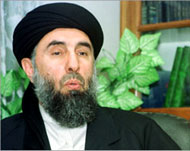Afghan ‘war criminals’ under scanner
An international rights group says Afghanistan’s US-backed government has numerous officials who are implicated in war crimes and they should be brought to justice.

The New York-based Human Rights Watch (HRW) has urged Afghan President Hamid Karzai to set up a special court to try major war criminals – including some who are part of his government – saying such a move is vital for the nation to emerge from a quarter-century of bloodshed.
The report by HRW on Thursday charges that numerous officials and advisers in Karzai’s government are “implicated in major war crimes and human rights abuses that took place in the early 1990s” – when Afghanistan was embroiled in a bloody civil war.
Karzai has put together a government that includes people who fought on all sides in the war.
He has vowed to end tribal wars, but has needed the support of regional tribal leaders to keep the peace in vast swaths of the remote countryside.
Bloodstained hands
Though Afghanistan has been at war more-or-less constantly since the 1970s, the report – “Bloodstained Hands: Past Atrocities in Kabul and Afghanistan‘s Legacy of Impunity” – focuses on a one-year period from April 1992 to March 1993, following the collapse of a Soviet-backed government in Kabul, when the civil war began.
 |
|
Former Afghan PM Gulbuddin |
“Rival armed factions committed extensive human rights abuses and violations of the laws of war, illegally shelling and rocketing civilian areas, abducting and murdering civilians, and pillaging civilian areas,” it says.
The group said many leaders implicated in the abuses are now officials in Karzai’s government – including Chief of Army Staff Abdul Rashid Dostum and Second Vice-President Karim Khalili.
Also cited is Mohammad Qasim Fahim, Karzai’s former defence minister, as well as former Prime Minister, Gulbuddin Hekmatyar.
Continuing threat
“Perpetrators of past abuses who go unpunished are more likely to commit new abuses and use violence to get their way,” said Brad Adams, executive director of the Asia Division of Human Rights Watch. “They pose a continuing threat to Afghanistan‘s future.”
The statement said that Human Rights watch “urged the Afghan government and international community to prioritise efforts to hold past perpetrators accountable for their crimes by creating a special court to try offenders.”
The report was issued after midnight in Afghanistan, and there was no immediate reaction from the government.
The report also stresses that some of the hundreds of people running in September parliamentary elections are guilty of war crimes.
Total imputiny
“In Afghanistan today, alleged war criminals – Taliban, mujahideen, communist – enjoy total impunity in the name of national reconciliation,” said Adams. “This is an insult to victims and an affront to justice.”
|
“In Afghanistan today, alleged war criminals – Taliban, mujahideen, communist – enjoy total impunity in the name of national reconciliation. This is an insult to victims and an affront to justice” Brad Adams, |
The report is based on interviews with more than 150 witnesses, survivors, government officials and combatants.
Few Afghans were left untouched during the country’s long years of warfare, from the communist coup of 1978 through Soviet occupation, the fighting between tribal leaders that followed, the rise of the Taliban and the US invasion that toppled the Taliban at the end of 2001.
Idea welcomed
In all, more than a million Afghans are believed to have died, while 6 million more fled the country to become refugees.
Karzai himself welcomed a call in January by the Afghanistan Independent Human Rights Commission for some type of war crimes tribunal, though he said the recommendation needed further study.
Some observers caution that a public examination of past crimes could inflame dangerous ethnic tensions. Faction leaders who stand accused of responsibility for past atrocities remain powerful.
But others argue that continued impunity for suspects – including tribal leaders who helped the United States fight the Taliban – is a stain on the international community’s efforts to rebuild Afghanistan and is sowing the seeds for future turmoil.